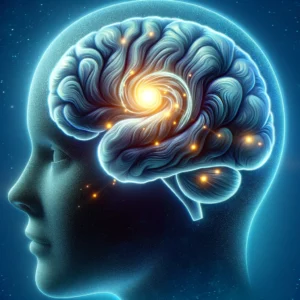Why We Should Regulate Circadian Rythms?

Circadian rhythms, the natural cycles of physical, mental, and behavioral changes that our bodies undergo in a 24-hour period, are fundamental to our well-being.
These rhythms, influenced by the natural light-dark cycle of our environment, govern a multitude of physiological processes – from sleep patterns to hormone release, eating habits, and even body temperature. Understanding and regulating these rhythms is crucial for maintaining optimal health and functioning.
At the core of these rhythms is the circadian clock, a complex system that operates as the body's master timekeeper.
FURTHER READING AND RESEARCH

Disruptions to this internal clock, such as those caused by jet lag, shift work, or poor sleep habits, can lead to a range of circadian rhythm sleep disorders.
These disorders not only affect our ability to fall asleep and wake up but can also have broader health implications.
For example, advanced sleep phase disorder alters the timing of sleep, leading to early sleep onset and wake times, which can disrupt daily life.
The intricate relationship between circadian rhythms and fitness is particularly noteworthy. Regular exercise can reinforce and stabilize these rhythms, but it's essential to understand the timing and type of activity for maximum benefit.
Additionally, factors like environmental cues, light exposure, and even meal timings play a significant role in influencing our circadian rhythms.
In this blog post, we delve into practical steps to improve circadian rhythm, offering advice for shift workers and frequent travelers who often face the challenges of a disrupted body clock.
We will also discuss how artificial and natural light, temperature variations, and lifestyle choices like eating habits impact these rhythms.
Finally, the article will address common queries about the body's circadian rhythms, shedding light on how to maintain a healthy, harmonious balance in our lives.
What are Circadian Rhythms?
Understanding the Basics of Circadian Rhythms
Circadian rhythms, the internal processes that regulate our sleep-wake cycle, play a crucial role in our daily lives.
These rhythms, which span approximately 24 hours, dictate not only when we fall asleep and wake up but also influence various physiological processes like hormone release, body temperature, and eating habits.
Governed by the brain's master clock, the suprachiasmatic nucleus, circadian rhythms are synchronized with the natural light and dark cycles of our environment, ensuring our bodies function optimally.
The Influence of Light and Dark
The circadian system is highly sensitive to changes in light and dark. Exposure to natural light during the day helps maintain a stable circadian rhythm, reinforcing our body’s natural tendency to stay awake and alert.
Conversely, darkness triggers the release of melatonin, a hormone that promotes sleep, signaling the body it's time to rest. This cycle of light and dark is pivotal in regulating our sleep patterns and overall well-being.
Disruption of Circadian Rhythms

Various factors can disrupt circadian rhythms, leading to sleep disorders and other health issues. Jet lag, shift work, and poor sleep habits can significantly affect circadian rhythms.
For instance, shift workers often experience disrupted sleep-wake cycles, leading to sleep deprivation and associated health risks.
Similarly, traveling across time zones can cause jet lag disorder, where the body’s internal clock is out of sync with the local time, causing difficulty in falling asleep and staying awake.
Circadian Rhythm Sleep Disorders

There are specific sleep disorders directly linked to circadian rhythm disruptions, such as advanced sleep phase disorder and delayed sleep phase disorder.
In advanced sleep phase disorder, individuals tend to fall asleep and wake up much earlier than the typical sleep schedule.
Conversely, delayed sleep phase syndrome is characterized by difficulty falling asleep at a conventional time, leading to late waking hours, which can disrupt daily activities.
The Role of the Circadian Clock
The Master Clock: Suprachiasmatic Nucleus
At the core of circadian rhythms is the master clock, located in the suprachiasmatic nucleus (SCN) of the brain.
The SCN coordinates the body's internal clock and circadian rhythms, responding to external cues like light and darkness.
It sends signals throughout the body, influencing various biological clocks in our organs and tissues, thereby regulating their circadian rhythms.

Molecular Mechanisms of the Circadian Clock
The functioning of the circadian clock involves complex molecular mechanisms, including the expression of specific 'clock genes.'
These genes and their interactions generate the oscillatory patterns observed in circadian rhythms.
Disruptions in these molecular processes can lead to irregularities in sleep-wake cycles and other bodily functions, impacting overall health.
Circadian Rhythms and Body Temperature
Body temperature is another critical aspect regulated by circadian rhythms.
There's a natural dip in core body temperature during the night, facilitating sleep onset. Conversely, the body warms up as morning approaches, helping us wake up.
Disruptions in this aspect of the circadian rhythm can lead to difficulty falling asleep or staying awake.

However, disruptions to these rhythms, often precipitated by lifestyle choices or environmental factors, are increasingly being linked to a host of health issues, ranging from sleep disorders and metabolic diseases to mood disorders such as bipolar disorder.
The SCN, located in the hypothalamus, acts as the master clock of the body, synchronizing various biological clocks throughout the body.
It responds to external light cues and regulates numerous body functions, including sleep-wake cycles, hormone release, body temperature, and eating habits.
This synchronization is critical; when misaligned, as seen in circadian rhythm disorders, there can be significant short-term and long-term health consequences.
In the short term, disturbances in circadian rhythms can affect cognitive functions such as concentration, memory recall, and decision-making abilities. For instance, a study published in the "Journal of Clinical Endocrinology & Metabolism" found that even minor disruptions to sleep cycles could impair cognitive function the following day.
These disturbances can also exacerbate symptoms of mental health disorders. Research in the "American Journal of Psychiatry" has linked disrupted circadian rhythms to heightened emotional reactivity and impaired mood regulation in individuals with bipolar disorder.
The long-term consequences of circadian rhythm disruptions are equally concerning. Chronic misalignment between our internal clock and external environment can lead to various health issues.
Shift workers, who often experience circadian misalignment due to irregular work hours, have been found to have an increased risk of metabolic syndromes, obesity, and cardiovascular diseases, as indicated by research in the "Annual Review of Nutrition."
Persistent disruptions in sleep patterns have been linked to a higher risk of developing neurodegenerative diseases. A study in "Neuroscience and Biobehavioral Reviews" suggests that long-termcircadian rhythm disturbances may contribute to the pathophysiology of Alzheimer's disease, possibly due to the disruption of sleep-dependent clearance of brain metabolites.
Maintaining a stable circadian rhythm is crucial for mental and physical health. Regular sleep schedules, appropriate light exposure, and healthy lifestyle choices can help regulate these internal cycles. Additionally, understanding the impact of these rhythms on various health aspects, from daily cognitive functioning to long-term disease risk, is vital in developing strategies for prevention and management.
As research continues to unfold, it becomes increasingly clear that the regulation of circadian rhythms is a fundamental aspect of health maintenance and disease prevention. The intricate interplay between our internal clock and various bodily functions underscores the importance of aligning our lifestyle with our natural biological rhythms. In doing so, we can potentially reduce the risk of a wide range of health issues, from immediate cognitive impairments to long-term degenerative diseases, thereby enhancing both our physical and mental well-being.
Circadian Rhythm and Sleep Disorders
The intricate relationship between circadian rhythms and sleep disorders is a subject of growing interest and concern in the medical community.
Sleep disorders like advanced sleep phase disorder and delayed sleep phase disorder, which are directly attributed to disruptions in the circadian system, profoundly affect an individual's life quality and health.
These conditions go beyond mere inconveniences, often leading to chronic sleep deprivation, which can have cascading effects on various aspects of health and daily functioning.
Advanced sleep phase disorder (ASPD) is characterized by an earlier than usual sleep onset and awakening times. People with ASPD often find themselves getting sleepy in the early evening and waking up in the early hours of the morning, unable to fall back asleep.
This misalignment can cause significant social and occupational impairments, as their sleep schedule is out of sync with societal norms and demands.
Research published in "Sleep Medicine Reviews" suggests that the prevalence of ASPD increases with age, highlighting the importance of understanding and addressing this condition in older populations.
Delayed sleep phase disorder (DSPD), on the other hand, is marked by a delay in the onset of sleep and wake times, leading individuals to fall asleep and wake up much later than desired or required.
This disorder is particularly prevalent among adolescents and young adults, significantly impacting their academic performance, work attendance, and overall daily productivity.
A study in the "Journal of Clinical Sleep Medicine" underscores the importance of timely diagnosis and intervention in DSPD, as prolonged misalignment with the natural sleep-wake cycle can lead to chronic sleep loss, mood disturbances, and academic or occupational difficulties.
Both ASPD and DSPD highlight the critical role of the circadian system in sleep regulation and the consequences of its disruption. These disorders not only affect sleep quality and duration but also have broader implications for physical and mental health.
For instance, a disrupted sleep-wake cycle is linked to metabolic disorders, cardiovascular diseases, and mood disorders. A study in "Chronobiology International" has shown that circadian misalignments, such as those seen in sleep phase disorders, can disrupt metabolic processes, increasing the risk of obesity and type 2 diabetes.
Addressing these circadian rhythm sleep disorders involves a multifaceted approach. Light therapy, chronotherapy, and cognitive-behavioral therapy have shown promise in realigning the sleep-wake cycle with the individual's desired schedule. Light therapy, in particular, is effective in treating DSPD by exposing individuals to bright light in the morning, thereby advancing their circadian phase. Chronotherapy, which involves gradually shifting sleep times, can also be beneficial, especially for DSPD patients. Additionally, maintaining a consistent sleep schedule, even on weekends and holidays, is crucial for stabilizing the circadian rhythm and improving overall sleep quality.
The Role of Light in Circadian Regulation
Light exposure, particularly natural light, plays a vital role in regulating circadian rhythms. Exposure to bright light during the day helps synchronize the body's clock, enhancing alertness and improving sleep quality.
Conversely, exposure to blue light, especially from artificial sources at night, can disrupt the sleep cycle, leading to sleep problems. Studies suggest that minimizing blue light exposure in the evening and maximizing natural light during the day can help regulate circadian rhythms and improve sleep.
Body Temperature and Circadian Rhythms
Body temperature is another critical factor influenced by circadian rhythms. A drop in core body temperature signals the body to prepare for sleep.
Disruptions in this aspect of the circadian cycle, often due to irregular sleep habits or environmental cues, can lead to difficulties in falling and staying asleep. Maintaining a consistent sleep environment that supports the natural dip in body temperature can aid in better sleep quality.
The Link Between Circadian Rhythms and Fitness

The relationship between circadian rhythms and exercise is a burgeoning field of study with significant implications for both amateur and professional athletes, as well as individuals seeking to optimize their fitness routines.
Understanding the body's internal clock and its influence on physical performance, endurance, and recovery can significantly enhance the effectiveness of exercise regimens.
Optimal Exercise Timing and Circadian Rhythm
The human body operates on a circadian rhythm, which impacts various physiological processes, including muscle function, hormone levels, and cardiovascular activity.
This rhythm influences the body’s readiness for exercise at different times of the day. For instance, strength and flexibility are found to peak in the afternoon, correlating with the body's increased core temperature, which improves muscle elasticity and overall performance.
Cardiovascular efficiency also tends to be higher in the late afternoon, as shown in a study in the "Journal of Sports Sciences," making it an ideal time for endurance training.
Hormonal Influence on Exercise Performance
Hormonal fluctuations throughout the day, governed by the circadian rhythm, play a critical role in determining exercise efficacy. Testosterone, crucial for muscle growth and strength, peaks in the morning, suggesting that strength training might be most beneficial when performed earlier in the day. Conversely, cortisol, a stress hormone that can inhibit muscle growth, also peaks in the morning, which might argue for later workouts to minimize its impact, as noted in research published in "Endocrinology."
Impact of Exercise on Circadian Rhythm
Interestingly, exercise itself can influence circadian rhythms. Regular physical activity has been shown to strengthen the circadian system, leading to improved sleep patterns and overall circadian health. A study in the "Journal of Physiology" demonstrated that regular exercise could shift the phase of the circadian clock, helping to realign disrupted sleep-wake cycles, such as those experienced by shift workers or individuals with jet lag.
Circadian Rhythms, Exercise, and Aging
The interaction between exercise and circadian rhythms also holds particular importance as we age. Aging is associated with changes in the circadian system, often leading to advanced sleep phase syndrome and disrupted sleep patterns. Exercise can mitigate these effects by reinforcing the strength and regularity of circadian rhythms, thus improving sleep quality and general health in older adults, as highlighted in research in "Gerontology."
Recovery and Circadian Rhythms
Recovery post-exercise is another aspect influenced by circadian rhythms. Muscle repair and growth predominantly occur during sleep, when growth hormone levels are elevated. Timing workouts to ensure adequate recovery time before sleep can enhance muscle repair and growth, as well as reduce the risk of injury. Additionally, the timing of nutrient intake post-exercise can interact with the body’s circadian rhythm to optimize recovery, as indicated in a study in the "International Journal of Sport Nutrition and Exercise Metabolism."
Circadian Rhythms and Athletic Performance
For athletes, aligning training schedules with individual circadian rhythms can be a crucial strategy for optimizing performance.
Chronotype, which refers to an individual’s natural inclination towards morning or evening activity, can affect performance in competitive settings.
Tailoring training and competition times to an athlete's chronotype may provide a competitive edge, as suggested in research published in "Sports Medicine."
Practical Applications for Everyday Fitness
For individuals looking to enhance their fitness regime, understanding their own circadian preferences can be beneficial.
Those who are morning-oriented may find greater enjoyment and performance in earlier workouts, while evening-oriented individuals might benefit from later exercise sessions.
Consistency in workout timing can further reinforce circadian rhythms, leading to improved sleep, recovery, and overall fitness outcomes.
The interplay between circadian rhythms and exercise is complex and multifaceted. Recognizing the optimal times for physical activity, based on the body's natural rhythms, can significantly enhance exercise performance, recovery, and overall health.
As research in this field continues to expand, it offers valuable insights for athletes, fitness enthusiasts, and the general population in harnessing the power of the body's internal clock to maximize the benefits of physical activity.
Long-term Health Implications
Long-term, the misalignment of circadian rhythms with lifestyle can lead to chronic health issues. For instance, shift workers, who often have irregular circadian patterns, are at higher risk for metabolic disorders, cardiovascular diseases, and certain types of cancer. This underscores the importance of aligning work schedules, whenever possible, with natural circadian rhythms.
Steps to Improve and Regulate Circadian Rhythms
Consistent Sleep Schedule & Sleep Wake Rhythm
Maintaining a consistent sleep schedule is a key strategy in regulating and avoiding disrupted circadian rhythms and optimizing overall health.
Circadian clocks are influenced by adhering to a regular pattern of going to bed and waking up at the same times daily, including weekends and holidays, individuals can significantly enhance the synchronization of their internal biological clock.
This regularity is not just about the quantity of sleep but also about its quality, which is crucial for bodily repair, cognitive function, and emotional well-being.
The benefits of a stable sleep cycles extend beyond improved sleep quality. It has a profound impact on various physiological processes, including hormonal balance, metabolic function, and immune system efficiency.
Irregular sleep patterns can disrupt the release of melatonin, the hormone responsible for regulating sleep-wake cycles, leading to difficulties in falling and staying asleep.
Consistency in sleep patterns ensures that melatonin release is appropriately timed, facilitating easier sleep onset and more restorative sleep.
Furthermore, a regular sleep schedule can help mitigate the effects of sleep disorders such as insomnia and circadian rhythm sleep disorders.
By establishing a consistent routine, individuals train their body to recognize the appropriate times for sleep and wakefulness, reducing the likelihood of sleep disturbances and nighttime awakenings.
This regularity can also improve daytime alertness and concentration, as the body becomes accustomed to predictable cycles of rest and activity.
Moreover, a consistent sleep schedule supports mental health. Irregular sleep patterns have been linked to mood disturbances and increased susceptibility to stress and anxiety.
By stabilizing the sleep-wake cycle, individuals can experience enhanced mood regulation and a greater sense of overall well-being.
Diet and Circadian Rhythms
Eating habits also play a significant role. Consuming meals at regular intervals aligns with the body's circadian patterns, aiding digestion and metabolism. Conversely, irregular eating patterns can disrupt circadian rhythms, leading to metabolic imbalances.
Environmental Factors and Sleep Hygiene
Creating an environment conducive to good sleep is crucial. This includes minimizing noise and light disturbances, maintaining a comfortable bedroom temperature, and reducing exposure to electronic devices before bedtime. These measures help the body prepare for rest, aligning with its natural circadian rhythm.
Managing Jet Lag and Shift Work
For those dealing with jet lag or shift work, gradual adjustments to sleep schedules before travel or work changes can help. Exposure to bright light at strategic times can also assist in resetting the internal clock. For shift workers, creating a dark, quiet sleep environment during the day is essential for aligning their circadian rhythm with their work schedule.

